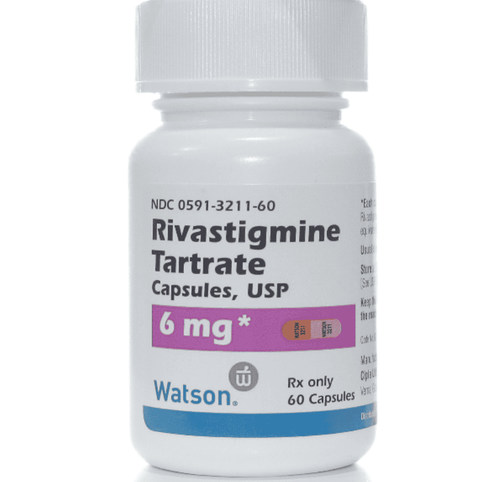This is an automatically translated article.
Aricept Evess 5mg is a drug used in the treatment of Alzheimer's and cerebrovascular dementia. In addition, Aricept is also made in 10mg strength. The treatment of dementia with Aricept should be prescribed by a specialist and experienced, and under the care and supervision of the patient's family.1. What is the effect of Aricept?
Aricept belongs to the group of drugs used to treat neurodegenerative diseases, with the main ingredient being donepezil hydrochloride. This active substance has a specific inhibitory and regenerative effect on acetylcholinesterase - a predominant cholinesterase in the brain.Aricept drug is prepared in the form of yellow tablets, content of 5mg or 10mg. It is indicated for the treatment of Alzheimer's disease (mild, moderate to severe) and vascular dementia (also known as cerebrovascular dementia).
2. Dosage and how to use Aricept
How to take Aricept is as follows: Put the tablet under the tongue, let the drug disintegrate and swallow, can be taken with water or not. Drink at night before going to bed.
Aricept drug dosage can refer to the following:
Start with 5mg/time/day and maintain for at least 1 month to assess clinical response and to stabilize the drug. After 4-6 weeks of dosing and clinical evaluation, the dose may be increased to 10 mg once daily. This is also the maximum recommended dose. If treatment is stopped, the effect of Aricept 5mg can be gradually reduced. The above treatment regimen can also be applied to patients with renal and hepatic impairment because the disease does not affect the clearance of the drug. However, in patients with mild and moderate hepatic impairment, dose adjustment should be based on tolerability.
In fact, the use of Aricept for treatment should be based on the patient's condition and the progression of the disease. It is best for patients to consult a specialist and consult a doctor to use the drug with the right dose.
3. Side effects of Aricept
In general, patients may experience some side effects such as diarrhea, nausea, vomiting, fatigue, insomnia, muscle cramps. These side effects are all possible in mild to moderate and severe Alzheimer's patients. The frequency of occurrence of side effects when using Aricept is as follows:
Very common: Symptoms of digestive disorders such as nausea, diarrhea, nausea. In addition, the patient may feel a headache. Common: Symptoms of psychosis such as agitation, aggressive behavior, hallucinations; symptoms of nervous system disorders such as insomnia, dizziness, fainting; symptoms of digestive disorders such as abdominal disturbances, vomiting; skin and subcutaneous tissue disorders with symptoms such as itching, rash; skeletal, connective tissue and musculoskeletal disorders such as spasticity; urinary disorders such as urinary incontinence. In addition, the patient may also feel pain all over the body, fatigue. Uncommon: Aricept rarely causes side effects of nervous system disorders such as seizures; heart disorders with bradycardia; serious digestive disorders such as peptic ulcer, gastrointestinal bleeding. If you have a test, you will see a slight increase in the creatine kinase level in the blood. Rare: Extrapyramidal symptoms of neurological disorders; heart disorders with sinus atrioventricular block, atrioventricular block; liver dysfunction, hepatitis. If there are manifestations of neurological disorders such as agitation, aggressive behavior, hallucinations after taking Aricept, the patient should reduce the dose. If liver dysfunction is observed but the cause is unknown, treatment discontinuation should be considered. To be on the safe side, it's best to contact your doctor as soon as you notice any of these side effects.
4. Some notes when using Aricept
People who are sensitive to the ingredients of the drug should not take Aricept. For patients with dementia, the treatment with Aricept should be prescribed by a qualified and experienced doctor, and under the regular supervision of family members. In the course of taking the drug, if it is found that the drug is still effective, continue to maintain it, if not, consider stopping the treatment. That is why it is necessary to clinically assess the patient's ability to respond to the drug after a period of taking the drug. Inform your doctor before taking Aricept about your medical condition, medical history, especially of the following: difficulty swallowing, asthma, chronic obstructive pulmonary disease, respiratory disorder, stomach ulcer, liver disease. kidney, prostate enlargement, urination disorders, cardiac arrhythmias, convulsive disorders, epilepsy. Pregnant or lactating women should use caution because studies on this group of subjects are limited. To be on the safe side, it's best to tell your doctor about your plans to become pregnant. Do not drive or operate machinery while taking Aricept. Tell your doctor about all medications you are taking, including prescription and over-the-counter medicines, herbs and vitamins, especially non-steroidal anti-inflammatory drugs, aspirin, celecoxib, diclofenac, ibuprofen, indomethacin , meloxicam, naproxen, ... Aricept is prescribed by specialists to treat mild, moderate to severe Alzheimer's disease and cerebral vascular dementia. During the treatment period (minimum 1 month), the patient should be clinically evaluated to monitor response to the drug and consider increasing the dose or stopping treatment.
Please dial HOTLINE for more information or register for an appointment HERE. Download MyVinmec app to make appointments faster and to manage your bookings easily.













